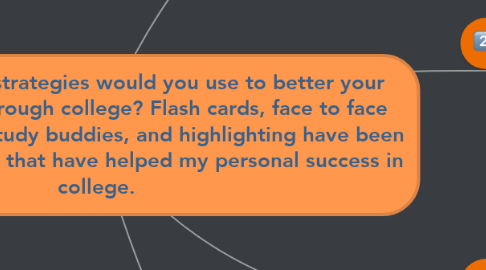What retention strategies would you use to better your personal success through college? Flash cards, face to face interaction, such as study buddies, and highlighting have been three main strategies that have helped my personal success in college.
by Haley L

1. In conclusion, flash cards, face to face interaction, such as study buddies, and highlighting have been three main strategies that have helped my personal success in college. They have helped many others as well with many surveys to prove it. Try branching out and see what works best for you, you never know until you try.
2. Flash Cards
2.1. According to (Wissman, Rawson and Pyc, 2012) out of 374 students surveyed, 67.6% agreed to using flash cards for their studies. Flash cards are used as a self tester for a lot of students and seem to help when trying to memorize and retain information.
2.2. When using flash cards, my memory uses it as a way to relate one thing to another, like correspondence. An example I have used is when you were a child you probably played games or sang songs like the alphabet that used the first letter and related it to an animal or object and that is how you learned what that letter looked like and also how to pronounce it.
3. Face-to-Face Interaction (Study Buddy)
3.1. Being a kinesthetic/tactile learner means that I need to be more involved or hands-on with me learning experience. I work better in groups and active classrooms than online and isolated studies.
3.2. In 2014 there was a study aimed towards "at risk" students to see if the pass rates would increase using a program called the Study Buddy Support scheme (Thalluri, O'Flaherty and Shepard, 2014). This survey also served another purpose of looking at the older students who were not "at-risk" and seeking our their mentoring capabilities.
4. Highlighting/Guiding
4.1. Highlight is all about the individual. Not everyone will highlight the same phrases or the same material but they will highlight what they think is important to them and their study materials.
4.2. According to (Dunlosky, Rawson, Marsh, Nathan and Willingham, 2013) "The analogy to highlighting is that a highlighted, underlined, or capitalized sentence will “pop out” of the text in the same way that the word “cow” would if it were isolated in a list of words for types of furniture."


